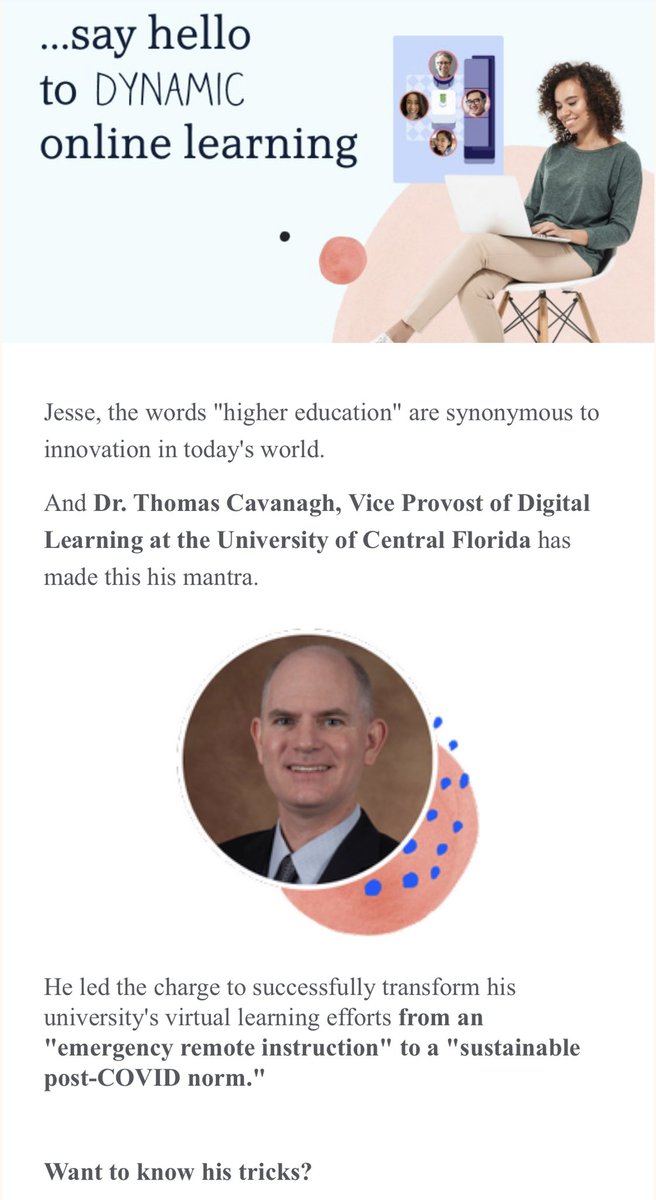
At the end of my recent piece with @mburtis, we rewrite the Quality Matters rubric "for a human audience, centering the people in a course instead of the tools, policies, and materials." (a thread) hybridpedagogy.org/the-cult-of-qu…
Martha and I write that "we don’t subscribe to any model that relies upon a simplified set of bullet points to do the vitally important work of instructional design." I often argue for "good-for-some-people-in-some-contexts-practices."
And so, we ask explicitly for folks not to approach our remix of the QM rubric as a set of best practices, but to use any course design rubric as an invitation to reimagine, inspect, adapt its advice from your own pedagogical perspective, for your own idiosyncratic work.
The Quality Matters rubric is just one trenchant example of what we describe as “the end point of traditional models of instructional design. [...] what happens when we don’t support nuanced, complex conversations about pedagogy and design.” hybridpedagogy.org/the-endgame-fo…
Our own "course design considerations" wonder at how online courses might look if they emphasized community over content, care over compliance, challenge over rigor, making our listening visible over clarity of "instruction." A few of our considerations:
* Start with "Hello, how are you?"
* Directly engage students in helping build and structure the course.
* Provide students with computers if they don’t have them.
* Listen to student introductions before sharing your own; put their voices first.
* Directly engage students in helping build and structure the course.
* Provide students with computers if they don’t have them.
* Listen to student introductions before sharing your own; put their voices first.
* Encourage students to inspect and re-author all learning objectives and competencies.
* Create flexible points of entry for every student, opportunities for students to challenge themselves, and space for them to share their accomplishments.
* Create flexible points of entry for every student, opportunities for students to challenge themselves, and space for them to share their accomplishments.
* Do not leave students feeling like a rug might get pulled out from under them.
* Find clarity in conversations with students, not in pre-authored policies and rules.
* Find clarity in conversations with students, not in pre-authored policies and rules.
* Engage students in thinking about the world they live in, the present moment, the material circumstances effecting them, their specific context, and their education.
* Stop requiring stuff. Offer invitations.
* Stop requiring stuff. Offer invitations.
* Be available to students to talk to them about their learning. Be a human being with real reactions to student work, not a template of prescribed responses.
* Encourage students to talk to each other about their learning.
* Encourage students to talk to each other about their learning.
* Recognize that different students engage at different times, in different ways, and that engagement looks different depending on context, material circumstances, the bodies we bring to a learning space, etc. Honor and celebrate those differences.
* Do not use tools that farm students’ data or intellectual property. Use tools that are designed in a way that respects student privacy and agency.
* Have conversations with students about how they use technology, but also about how we decide what tools to use and about the ethical and legal obligations of technology companies.
* Make sure students have the help they need. Or that they can find it.
* Make sure students' basic needs are being met. Collaborate directly with staff colleagues in financial aid, disability resources, tutoring, student success, the library, IT, etc.
* Make sure students' basic needs are being met. Collaborate directly with staff colleagues in financial aid, disability resources, tutoring, student success, the library, IT, etc.
* Meet legal requirements regarding accessibility; they are not a choice. Learn more about them through the experts on your campus that work in offices like disability services.
* But engage more thoughtfully than just meeting bare minimum legal requirements.
* But engage more thoughtfully than just meeting bare minimum legal requirements.
Finally, talk about considerations like these with students. Critique the Quality Matters rubric with students. Turn Bloom's Taxonomy on its head with students. Investigate with students how traditional models of instructional design can do harm to marginalized students.
If you or your faculty are required to engage with the Quality Matters rubric (or some other standardized model), undertake a similar activity to the one I've shared here. Reflect on and rewrite advice that does harm, advice that patronizes you or the students you work with.
Then, brainstorm your own list of considerations that work with your students, in your location, from your own embodied experience as a teacher. Share some of those ideas and approaches here and talk about them with colleagues.
• • •
Missing some Tweet in this thread? You can try to
force a refresh




